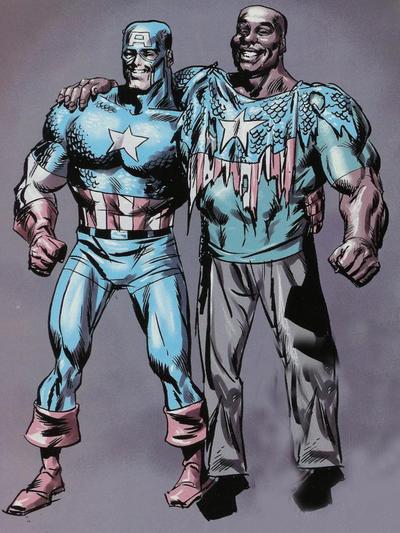I wrote a post on the Robert Morales/Kyle Baker “Truth” a little bit back, and both Conseula Francis and Qiana Whitted felt my take on the story’s ending was too positive. I thought I’d highlight their comments here.
Conseula Francis:
I don’t know if I buy that America is being assimilated into Bradley. White Cap, as a symbol and as an individual white guy, is being salvaged in those last images. Because Steve Rogers, in uniform, continues to be such a decent guy and is innocent of all the bad shit that happened to Isaiah, and because the threat of Isaiah ever competing to wear the uniform is removed, all can be well at the end of this book. I think the first six issues of this book are Isaiah’s and the last issue is Steve’s. This is a happy ending for Steve, for whiteness, for America–“we acknowledge the sin, so we are absolved of it” this conclusion seems to be saying. And that’s because in 616 continuity Steve matters, not Isaiah. Whiteness matters, is central. Blackness is something we can acknowledge as long as it doesn’t contaminate. Imagine where this story might go in continuity if it got connected to the jailhouse experiments that gave Luke Cage is powers, or to the European colonizing efforts that Wakanda managed to fight off, if Miles Morales got to explain how being a super-powered mutant is not, in fact, just like being black.
Reading back over this, it sounds like I don’t like this book, which is not true at all. I like it a lot. The ending, though, feels like such a betrayal of the rest of the story.
Qiana Whitted:Much like Conseula, I felt like the ending was a betrayal of the rest of the story. I remember reading it when it came out and turning back at the cover page of the last issue because I wasn’t even sure it was the same writer. I also thought that part of the story’s value and potential had a lot to do with the way Bradley’s experience encouraged us to re-read the silences in the early Golden Age superhero comics. The idea that people like Bradley and his fellow soldiers – whether they existed in the official continuity or not – had always been there and never acknowledged was in itself quite powerful. I think I would have even been okay with symbolic resonance of Bradley’s state of mind in the conclusion if Rogers had not appeared to “set things right.” And I mean, I can appreciate the warm fuzzies of the wall of photos, but wouldn’t it have been awesome to see Bradley pictured alongside his fictional peers? Other superheroes? (Not just Rogers?) Would that have been a even bigger risk? That’s why I see this as a missed opportunity.

